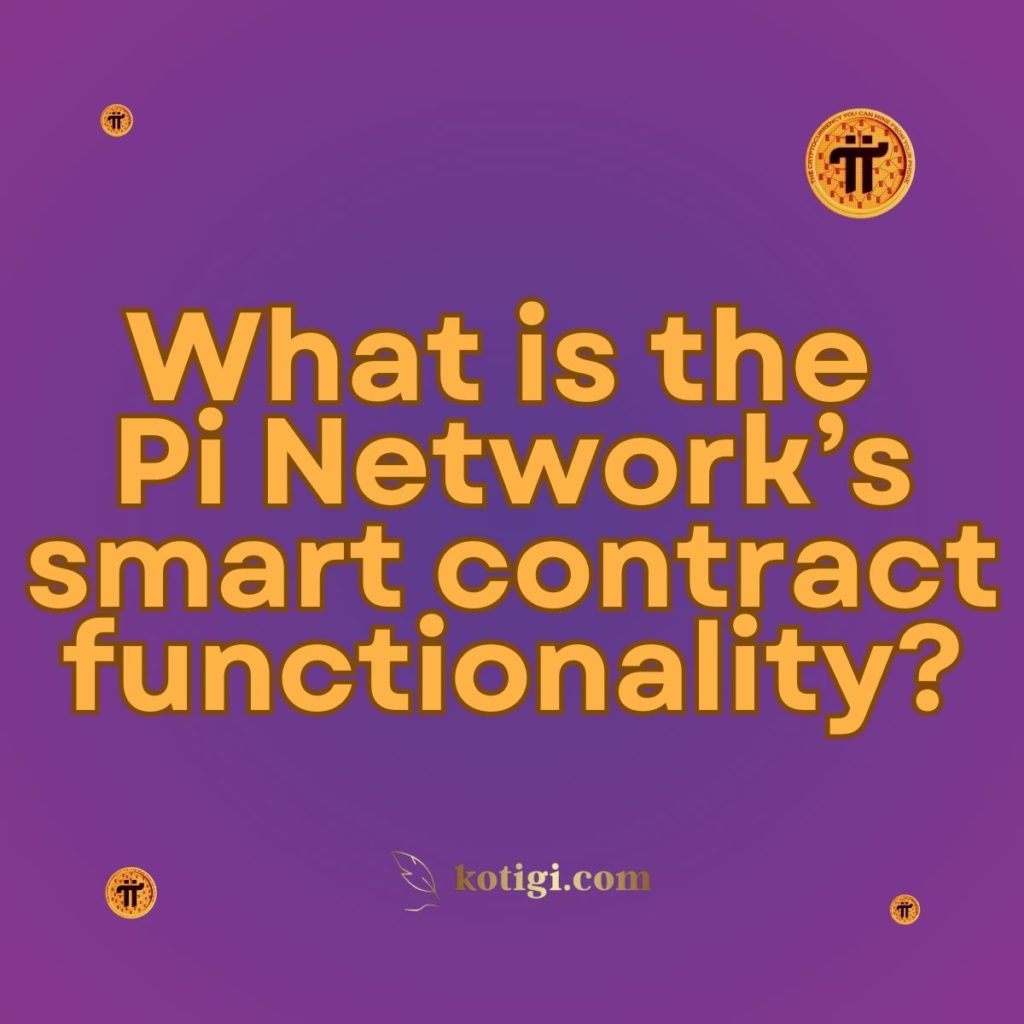
What is the Pi Network’s smart contract functionality?
The Pi Network’s smart contract functionality is a vital component of its blockchain ecosystem, enabling developers to create decentralized applications (dApps) that operate autonomously. Through the use of smart contracts, Pi Network aims to enhance transparency, security, and efficiency in transactions. This post explores the smart contract functionality within the Pi Network, detailing its features, benefits, and how developers can leverage this technology to build innovative solutions.
Introduction
Smart contracts have revolutionized the way transactions and agreements are executed in the digital age. By automating processes and eliminating the need for intermediaries, they enhance trust and efficiency across various applications. The Pi Network, known for its unique approach to building a user-friendly blockchain, has integrated smart contract functionality to empower developers and users alike. This article delves into the smart contract functionality of the Pi Network, highlighting its significance, how it works, and the potential applications that arise from it.
What Are Smart Contracts?
Smart contracts are self-executing contracts with the terms of the agreement directly written into code. Operating on blockchain technology, they provide a level of transparency and immutability that traditional contracts lack. Once deployed, smart contracts execute automatically when predetermined conditions are met, eliminating the need for intermediaries and reducing the risk of fraud. This transformation in contract execution has the potential to redefine trust in digital transactions.
Characteristics of Smart Contracts
- Autonomous Execution: Smart contracts operate independently, executing transactions automatically when specified conditions are satisfied. This feature ensures that all parties adhere to the agreed-upon terms without the need for a third party.
- Transparency: All participants have access to the terms and execution of smart contracts on the blockchain, fostering trust among parties involved in the agreement. This transparency not only builds confidence but also mitigates disputes, as all transactions are recorded and publicly available.
- Security: The decentralized nature of blockchain technology protects smart contracts from unauthorized changes. This security aspect is crucial in safeguarding sensitive data and ensuring that the contract operates as intended.
- Cost-Efficiency: By removing intermediaries, smart contracts significantly reduce transaction costs. This cost-effectiveness benefits users and encourages more parties to engage in smart contract transactions.
Smart Contract Functionality in Pi Network
The Pi Network has incorporated smart contract functionality to enable developers to create decentralized applications (dApps) that operate on its blockchain. This functionality offers a range of features designed to facilitate efficient and secure dApp development, positioning the Pi Network as a conducive environment for innovation.
Features of Smart Contracts in Pi Network
- Ease of Use: The Pi Network aims to make smart contract development accessible to all developers, regardless of their technical expertise. User-friendly tools and comprehensive documentation are provided to assist in the creation of smart contracts, ensuring that both novice and experienced developers can contribute to the ecosystem.
- Compatibility: Pi Network’s smart contracts are designed to be compatible with various programming languages, allowing developers to choose the language they are most comfortable with. This flexibility is crucial in attracting a diverse range of developers to the platform, facilitating the growth of its ecosystem.
- Testing Environment: Developers have access to a dedicated testing environment where they can experiment with their smart contracts before deploying them to the main network. This ensures that any issues can be identified and resolved prior to execution, enhancing the reliability of the applications.
- Integration with Pi Wallet: Smart contracts can interact seamlessly with the Pi Wallet, enabling users to manage their assets and execute contracts easily. This integration simplifies the user experience, making it straightforward for users to engage with the smart contracts.
Benefits of Smart Contract Functionality
The implementation of smart contract functionality within the Pi Network offers numerous benefits for developers and users alike. By fostering a conducive environment for dApp development, the Pi Network is paving the way for innovative solutions and increased user engagement.
Enhanced Trust and Security
By automating transactions and ensuring that they are executed only when specified conditions are met, smart contracts enhance trust and security among users. This is particularly crucial in financial transactions, where the risk of fraud can be significant. The immutability of smart contracts ensures that once a contract is executed, it cannot be altered, providing a level of assurance that traditional agreements often lack.
Increased Efficiency
Smart contracts eliminate the need for intermediaries, significantly speeding up transaction times. This increased efficiency allows for quicker execution of agreements and reduced operational costs. As a result, users can engage in transactions with greater confidence, knowing that their agreements will be honored without unnecessary delays.
New Opportunities for Developers
With the ability to create dApps using smart contracts, developers can explore new business models and services. This innovation can lead to the development of various applications across multiple industries, from finance to supply chain management. By providing developers with the tools to build on the Pi Network, the platform encourages creativity and entrepreneurship, fostering a vibrant ecosystem of dApps.
Use Cases of Smart Contracts in Pi Network
The smart contract functionality of the Pi Network opens the door to various applications across different sectors. Here are a few potential use cases that highlight the versatility and power of this technology.
Decentralized Finance (DeFi)
Smart contracts can facilitate DeFi applications, allowing users to engage in lending, borrowing, and trading without intermediaries. This enables a more democratized financial landscape, where users have greater control over their assets and can benefit from lower fees. DeFi applications built on the Pi Network can attract users looking for innovative financial solutions.
Supply Chain Management
Smart contracts can streamline supply chain processes by automating transactions and tracking goods in real-time. This enhances transparency and efficiency, allowing all parties to monitor the movement of products. By implementing smart contracts, companies can reduce fraud, increase accountability, and improve overall supply chain visibility.
Gaming and NFTs
Developers can create games and non-fungible tokens (NFTs) that utilize smart contracts for asset ownership and transactions. This enables players to buy, sell, and trade digital assets securely within the gaming ecosystem. The integration of smart contracts in gaming can create new revenue streams and enhance player engagement.
Challenges in Implementing Smart Contracts
While the benefits of smart contracts are significant, there are also challenges to consider when implementing this technology within the Pi Network.
Complexity of Development
Creating smart contracts requires a solid understanding of blockchain technology and programming languages. Developers may face a steep learning curve, particularly those who are new to the space. Ensuring that adequate resources and support are available will be crucial in addressing this challenge and fostering a strong development community.
Security Risks
Despite their inherent security features, smart contracts can still be vulnerable to coding errors or exploits. Thorough testing and audits are essential to mitigate these risks and ensure the safety of the contract. The Pi Network must prioritize security measures to protect its users and maintain trust in its smart contract ecosystem.
Regulatory Uncertainty
The legal status of smart contracts is still evolving. Developers must stay informed about regulations that may affect their use of smart contracts to ensure compliance and avoid potential legal issues. Engaging with policymakers and advocating for clear regulations can help create a more stable environment for smart contracts.
Conclusion
The Pi Network’s smart contract functionality represents a significant advancement in its blockchain ecosystem. By enabling developers to create decentralized applications, the Pi Network fosters innovation, enhances security, and promotes trust among users. As the technology continues to evolve, the potential for smart contracts within the Pi Network is vast, paving the way for new opportunities and applications across various industries. With the right support and resources, the Pi Network can emerge as a leader in the smart contract space, attracting developers and users alike to its vibrant ecosystem.
Key Takeaways:
- Smart contracts are self-executing agreements coded on the blockchain, providing transparency and security.
- The Pi Network offers user-friendly tools and a supportive environment for developers to create and deploy smart contracts.
- Benefits include enhanced trust, increased efficiency, and new opportunities for innovative applications.
- Potential use cases span various sectors, including decentralized finance, supply chain management, and gaming.
- Challenges include development complexity, security risks, and regulatory uncertainty that need to be addressed.




